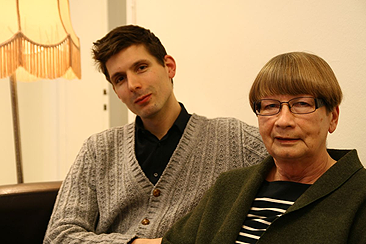What did you Quine today?
25 januari 2010 | In Meta-ethics Meta-philosophy Moral Psychology Naturalism | Comments?”Does it contain any experimental reasoning, concerning matter of fact and existence?” – David Hume
In last weeks installment of the notorious radio show that I’ve haunted recently, I spoke to the lovely lady on my left on the picture below about the use of empirical methods in moral philosophy. The ”use of empirical methods” of which I speak so fondly is, on my part, constricted to reading what other people has written, complaining about the experiments that haven’t been done yet, and then to speculate on the result I believe those experiments (not yet designed) would yield.
Anyway: I have a general interest in experimental philosophy, but I haven’t signed anything yet, you know what I mean? That is: I don’t think (what the host of the radio show wanted me to say) that ”pure” armchair philosophy is uninteresting. Indeed, I believe that any self-respecting empirical scientist ought to spend at least some time in the metaphorical armchair, or nothing good, not even data, can come out of the process.
When coming across a philosophically interesting subject matter (and, let’s face it, they’re all philosophically interesting, if you just stare at them long enough. Much of our discipline is like saying the word ”spoon” over and over again until it seems to loose its meaning, only to regain it through strenuous conceptual work) I often find it relevant to ask ”what happens in the brain”? What are we doing with the concept? It is obviously not all that matters, but it seems to matter a little. Especially when we disagree about how to analyze a concept, there might be something we agree on. Notoriously, with regard to morality, we can disagree as much as we like about the analysis of moral concepts, but agree on what to do, and on what to expect from someone who employs a moral concept, no matter what here meta-ethical stance. Then, surely, we agree on something and armchair reasoning just isn’t the method to coax it out.
I try to be careful to emphasize that empirical science is relevant to value-theory, according to my view, given a certain meta-ethical outlook. Given a particular way to treat concepts. If we treat value as a scientific problem, what can be explained. Since there is no consensus on value, we might as well try this method. Whether we should or not is not something we can assess in advance, before we have seen what explanatory powers the theory comes up with.
Treating ”value” as something to find out about, employing all knowledge we can gather about the processes surrounding evaluation etc. is, in effect, to ”Quine” it. It seems people don’t Quine things anymore, or rather: that people don’t acknowledge that this is what they’re doing. To Quine something is not the same as to operationalize it, i.e. to stipulate a function for the concept under investigation, and to say that from now on, I’m studying this. To Quine it is to take into consideration what functions are being performed, which have some claim to be relevant to the role played by the concept, and to ask what would be lost, or gained, if we were to accept one of these functions as capturing the ”essence” of it. It is to ask a lot of round about questions about how the concept is used, what processes influence that use and so on, and to use this as data to be accounted for by an acceptable theory of it.

A Lamp, David Brax (yours truly) and Birgitta Forsman (I cannot speak for her, but I’m sure she likes you to). The lamp did not volunteer any opinions on the subject matter, but has offered to participate in a show on a certain development in 1800-century philosophy. Foto: Thomas Lunderqvist